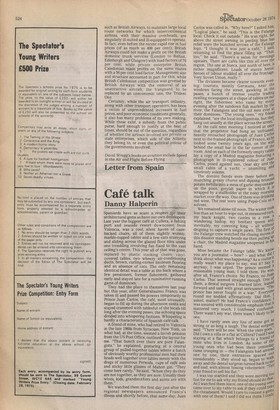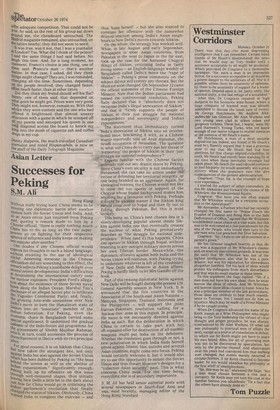Letter from Spain
Café talk
Danny Halperin
Spaniards have as scant a respect (pr their architectural gems as have our own developers. Last year the biggest café at Cullera, a fishing port and seaside resort downcoast from Valencia, was a cool, silent haven of canebacked chairs, all of them slightly wobbly, marble-topped tables and a few cats scurrying and sliding across the glazed floor tiles under one trembling revolving fan fixed to the vast ceiling's centre. This year all of that was gone, replaced by plastic stacking chairs, vinylcovered tables, two wheezy air-conditioning ducts, brown, curling-corner linoleum flooring and an absence of cats. The only remaining identical detail was a table at the back where a few pensioners, former fishermen, gathered early and stayed late for a ruminative running game of dominoes. They had the place to themselves last year but this year, after Generalissimo Franco was taken ill and passed his powers temporarily to Prince Juan Carlos, the café, most unusually, began to fill up during the afternoon siesta and stayed crammed with tablesful of the locals till long after the evening paseo, the echoing space divided into whispering factions. Whispering is hardly a characteristic of Spanish café talk.
A friend of mine, who had retired to Valencia in the late 1960s from Syracuse, New York, on what had, at the time, seemed a lavish pension from the US Post Office, outlined the layout for me. "That bunch over there are pure Falangists," he explained, gesturing at a central group of pulled-together tables where a batch of obviously worthy professional men had their heads well together over tables messy with the dregs of numerous Pernods, cups of café solo and sticky little glasses of Mahon gin. "They come here rarely," he said. "When they do they are not together, as they are now. Usually their wives, kids, grandmothers and aunts are with them."
We watched them the first day just after the regional newspapers announced Franco's illness and shortly before, that same day, Juan
Carlos was called in. "Why here?" I asked him "Logical place," he said. 'This is the Falange local. Check it out outside." He was right. Set above the street awning in peeling blue bas relief were the bunched arrows of the Falange logo. "I thought it was just a café," I said, returning to find the place filling up. `That, too," he said. 'There's a salon for meetings upstairs. There are cafés like this all over the region. The one at Sueca, just north of here, IS rather magnificent. Loads of stucco heroic heroes of labour studded all over the frontage. Very Soviet Union, really." The divisions became clearer towards evening: tourists, mostly Germans, near the windows facing the street, gawking at the paseo, a bunch of intense youths trading rustling newspapers at a clique of tables on our right, the fishermen who came by ever)' evening after the sundown fish market by the river, the Falangists and the old men ever ad their their dominoes. "The young ones," my frien explained, "are the local intelligentsia, but the hang out usually at the place across the street. At the café next morning I noticed at once that the proprietor had hung an unframed, heavily retouched photograph of Juan carlos next to the framed photograph of Franco, as he. looked some twenty years ago, on the wan behind the small bar in the far corner of the room. And on each of the formerly empty tables lay a copy of a Madrid magazine featuring 4 photograph in ill-registered colour of Jua.11 Carlos, posed against sun, clear, sky andWI small cabin of a yacht — unsmiling env timelessly solemn. The domino fiends were there before Mei munching greasy churos and dipping bronz.e" potato tortilla into a mess of garlic mayonnals.e on the plain, greyish paper in which It ls wrapped by a stallholder at the noisy mortnng market over the way. One of them was drinking red wine. The rest were using Pepsi-Cola as a solvent. We remained alone till noon. The waiter took less than an hour to wipe out, in measured turn, my black knight, two castles in a row, wandering bishop, my hesitant queen env,' inevitably, my cowering king — all wallow; deigning to capture a single pawn. The first 0, the Falange crew watched the closing moves 01 this disaster standing beside me then pulling IIP a chair, the Madrid magazine unopened in his hand. Mine became the Falange table. We knal you are a journalist — how? — and what did. think about what was happening? As a visitor !t really wasn't my place to say, was it? Say It anyway, I was urged. The prince seemed a reasonable young man, I told them. He Wa5r; after all, Franco's choice. No Franco, no Jaa,.:i Carlos. That seemed straight enough. One vd them, a dental surgeon I learned later, lea_ti.e.„ forward and said with great seriousness: "I": prince has never fought in a war," EverYan; round me nodded affirmatively. Did that, asked, matter? He had Franco's confidence... was assured with considerable emphasis that mattered very much. I confessed confusion: There wasn't any war, there wasn't likely to be one. I have rarely seen any line of mine get a„s strong or as long a laugh. The dental surgea`,1 said: 'There will be one. When the viejo goesDid I own a villa or a flat at Cullera? I said Wasf staying at a flat which belongs to a friend mine who lives in London. As some young ones who had been there yester,daYci came trooping in — the Falangists had arrINT,t one by one, their entrances spaced considerably — they stood up, began to wa": away and the dental surgeon turned back to ttli and said, with almost hissing vehemence: your friend to sell his flat." I was too startled and they were moving t°.° fast for me to ask why my friend should do th% As I watched them leave, one of the young one, came over to my table to ask if they could tak the chessboard. Would I care to contest a Olt with one of them? I said I did not think 1 coult
Offer adequate competition. That could not be true, he said, as the rest of his group sat down around me, the chessboard untouched. The Madrid magazine remained, also untouched, on the tables nearby; they did not seem to see it. It was true, was it not, that I was a journalist in London? Yes. What did I think of the prince? I said the same things I had said before. No laugh this time. And, for a long moment, no comment. Franco's choice is one thing, one of them said; F'ranco's man — that's another matter. In that case, I asked, did they think things might change? They are, I was reminded, Changing all the time. Sometimes, depending on the people involved, they changed faster, Often much faster, than at other times.
Did they think my friend should sell his flat? Surely, one of them said, that depended on What price he might get. Prices were very good. They might not, however, remain so. With that advice they were content and the one who had Offered it brightened that almost uneasy afternOon with a game in which he scooped off all my pawns and swooped his queen in one ;Ong diagonal across the board to knock my lung into the mush of cigarette ash and coffee dregs in my cup.
Panny Halperin, the much-travelled Canadian Marna/1st and noted Hispanophile, is now on the staff of the Daily Telegraph Magazine











































 Previous page
Previous page